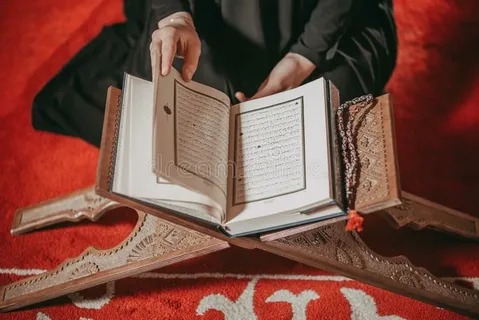In the vast realm of Islamic spirituality, few verses hold as much significance as Ayat al-Kursi. This sacred verse, found in the Quran, is revered for its depth of meaning and spiritual potency. In this article on Arabian Tongue website, we will embark on a journey to understand the profound essence of Ayat Kursi, exploring its historical context, linguistic beauty, and spiritual significance.
The Quran: A Source of Divine Guidance

Before delving into Ayat al-Kursi, it’s crucial to acknowledge the Quran’s role as a timeless source of divine guidance. Muslims around the world turn to this holy book for spiritual enlightenment, moral guidance, and solace in times of need.
Recommend: the importance of reciting the holy quran daily
Ayat al-Kursi: A Jewel in the Quran

Ayat al-Kursi, also known as the Throne Verse, is found in Surah Al-Baqarah (Chapter 2), Verse 255. Let’s dissect this verse to understand its significance:
“Allah! There is no deity except Him, the Ever-Living, the Sustainer of existence. Neither drowsiness overtakes Him nor sleep. To Him belongs whatever is in the heavens and whatever is on the earth. Who is it that can intercede with Him except by His permission? He knows what is before them and what will be after them, and they encompass not a thing of His knowledge except for what He wills. His Kursi extends over the heavens and the earth, and their preservation tires Him not. And He is the Most High, the Most Great.”
This verse encapsulates the monotheistic essence of Islam, affirming the oneness of Allah and His unparalleled knowledge and sovereignty.
Linguistic Beauty
One cannot help but marvel at the linguistic beauty of Ayat al-Kursi. The eloquence and precision of the Arabic language used in this verse serve as a testament to the Quran’s divine origin. The rhythmic flow of words and the profound message they convey continue to captivate believers and linguists alike.
Read more: Benefits of Reading Surah Yaseen after Fajr
Spiritual Significance for ayat kursi
Ayat kursi includes many of the benefits and importance of the Quran when recited and give the following Muslim:
- Protection and Blessings: Ayat al-Kursi is often recited for protection against negative forces and evil influences. Believers turn to this verse as a shield, seeking Allah’s safeguarding presence in their lives. Its recitation is believed to invite blessings and tranquility.
- A Bridge to the Divine: Many see Ayat al-Kursi as a bridge that connects the believer to the divine realm. It serves as a reminder of Allah’s infinite knowledge and power, nurturing a sense of awe and reverence.
- A Source of Comfort: In times of distress or uncertainty, reciting Ayat al-Kursi provides solace and reassurance. It reminds believers that Allah is in control of all things and is the ultimate source of strength.
Benefits of Ayat kursi

Reciting ayat kyrsi has great benefits for the Muslim when recited, among them:
- Warding Off Evil: Regular recitation of Ayat Kursi is thought to repel negative energies and evil influences. It creates a protective aura around the individual, shielding them from harm, know that how to protect yourself from witchcraft
- Tranquility and Serenity: The soothing and melodious recitation of Ayat Kursi brings inner peace and tranquility. It helps alleviate stress and anxiety, allowing believers to find solace in their faith.
- Incorporating Ayat Kursi into Daily Life: To harness the benefits of Ayat Kursi, it is essential to incorporate it into your daily routine. This can be done by reciting it after obligatory prayers or as part of your evening supplications.
- Understanding the Meaning: While reciting Ayat Kursi, take the time to understand its meaning. Reflect on the profound message it conveys, and let its words resonate deep within your heart.
- Healing and Solace: In times of distress and hardship, Ayat Al Kursi offers solace and healing. Its recitation can provide a sense of peace and tranquility to troubled hearts. Believers turn to this verse for emotional and spiritual support during challenging moments.
- Enhancing Concentration in Prayer: When recited before prayer, Ayat Al Kursi helps enhance concentration and devotion. It clears the mind of distractions, allowing the worshipper to connect more deeply with their prayers. This heightened focus can lead to a more fulfilling spiritual experience.
Learn Now: Online Quran Classes
FAQs
What is the significance of Ayat al-Kursi in daily prayers?
Ayat al-Kursi is often recited in daily prayers as a means of seeking Allah's protection and blessings. It serves as a reminder of His sovereignty and knowledge.
Can Ayat al-Kursi be recited for specific intentions or needs?
Yes, believers often recite Ayat al-Kursi for various intentions, such as seeking guidance, warding off negative influences, or finding comfort in times of difficulty.
Is there a specific time or occasion when Ayat al-Kursi is recommended to be recited?
While it can be recited at any time, some Muslims prefer to recite it after their daily prayers or before going to bed for added protection and spiritual connection.
What are the benefits of contemplating Ayat al-Kursi's meaning?
Contemplating the meaning of Ayat al-Kursi deepens one's understanding of Allah's attributes and reinforces faith. It can also foster a sense of peace and trust in His divine plan.
Are there any recommended etiquettes for reciting Ayat al-Kursi?
It is recommended to recite Ayat al-Kursi with sincerity and devotion, ideally in a state of ritual purity. It's also customary to seek Allah's blessings and guidance before and after its recitation.
Conclusion
In the vast tapestry of Islamic spirituality, Ayat al-Kursi shines as a radiant jewel. Its linguistic beauty, profound message, and spiritual significance make it a cornerstone of faith for Muslims worldwide. As believers, we find solace, protection, and a deeper connection to the divine through the recitation and contemplation of this sacred verse.


